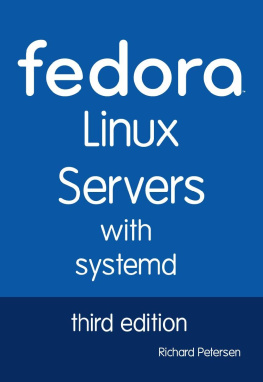Fedora Linux
Servers
with
systemd:
third edition
To Aleina and Larisa
in sync again
Fedora Linux Servers with systemd: third edition
Richard Petersen
Surfing Turtle Press
Alameda, CA
www.surfingturtlepress.com
Please send inquiries to:
ISBN:
ISBN-13:
Copyright Richard Petersen, 2018
All rights reserved
Copyright 2018 by Richard Petersen. All rights reserved. Printed in the United States of America.
Except as permitted under the Copyright Act of 1976, no part of this publication may be reproduced or distributed in any form or by any means, or stored in a database or retrieval system, without the prior written permission of the publisher, with the exception that the program listings may be entered, stored, and executed in a computer system, but they may not be reproduced for publication.
Information has been obtained by Surfing Turtle Press from sources believed to be reliable. However, because of the possibility of human or mechanical error by our sources, Surfing Turtle Press, the author Richard Petersen, or others, Surfing Turtle Press does not guarantee the accuracy, adequacy, or completeness of any information and is not responsible for any errors or omissions or the results obtained from use of such information.
Limit of Liability and Disclaimer of Warranty: The publisher and the author make no representation or warranties with respect to the accuracy or completeness of the contents of this work and specifically disclaim all warranties, including without limitation warranties of fitness for a particular purpose. The information and code in this book are provided on "as is" basis. No warranty may be created or extended by sales or promotional materials. The advice and strategies contained herein may not be suitable for every situation. This work is sold with the understanding that the publisher is not engaged in rendering legal, accounting, or other professional services. Surfing Turtle Press and anyone else who has been involved in the creation or production of the included code cannot and do not warrant the performance or results that may be obtained by using the code.
Trademark Acknowledgements
UNIX is a trademark of The Open Group
Microsoft and MS-DOS are registered trademarks of Microsoft Corporation
IBM and PC are registered trademarks of the International Business Machines Corporation
Red Hat and Fedora are trademarks of Red Hat, Inc.
 and
and  are trademarks of Red Hat, Inc
are trademarks of Red Hat, Inc
Fedora and the Infinity design logo are trademarks of Red Hat, Inc
See www.fedoraproject.org/wiki/Logo/ for more information
 is a trademark of Surfing Turtle Press
is a trademark of Surfing Turtle Press
Preface
This book is designed as a server reference for Fedora Linux with systemd. This second edition is based on Fedora Linux 28. Administration tools are covered as well as the underlying configuration files and system implementations. The emphasis is on what administrators will need to know to perform key networking and server tasks. Topics covered include the systemd service manager, the systemd service and target files for each server, server roles, and the FirewallD firewall. Key servers are examined, including Web, FTP, CUPS printing, NFS , and Samba (Windows shares). Network support servers and applications covered include the Squid proxy server, the Domain Name System server, and DHCP .
The book is organized into five parts: system tools, Internet servers, shared resources, network support, and administration topics.
Part 1 focuses on system tools such as the systemd service manager, the FirewallD firewall, and shell scripts. A Getting Started chapter covers the basics of the GNOME desktop, software management, and desktop terminals.
Part 2 examines Internet servers. Configuration and implementation of the Postfix and Sendmail mail server, the vsftpd and ProFTPD FTP servers, and the Apache Web server are covered in detail.
Part 3 deals with servers that provide shared resources on a local network or the Internet. Services examined include the Cups printing server, NFS network file server, the Samba Windows file and printing server, and the GFS distributed file system.
Part 4 covers servers that provide network support such as the Squid proxy server, the Bind Domain Name System (DNS) servers, IPv 6 auto-configuration, and DHCP servers.
Part 5 covers administration topics such as basic administration tasks, configuring the shell, and TCP/IP networks.
Overview
Contents
Part 1: System Tools
Fedora Linux Introduction
Linux consists of the operating system program, referred to as the kernel, originally developed by Linus Torvalds. It has always been distributed with a massive number of software applications, ranging from network servers and security programs to office applications and development tools. Linux has evolved as part of the open source software movement, in which independent programmers joined together to provide free quality software to any user. Linux has become the premier platform for open source software, much of it developed by the Free Software Foundations GNU project. Many of these applications are bundled as part of standard Linux distributions. Currently, thousands of open source applications are available for Linux on the Fedora software repository. Most of the administration, server, and desktop applications are incorporated into the Fedora repository, using software packages that are Fedora compliant.
Fedora Linux
The Fedora release is maintained and developed by the Fedora Project and consists entirely of open source software. Development is carried out using contributions from Linux developers, allowing them free rein to promote enhancements and new features. The project is designed to work much like other open source projects, with releases keeping pace with the course of rapid development. The Fedora project features detailed ).
The Fedora logo depicts an f encased in a blue circle. On the desktop's top panel the blue Fedora logo is the icon for the Applications menu. The logo has its own package, fedora-logos . The logo is designed to represent three features of the Linux community and development: freedom, communication, and infinite possibilities - the f for freedom, which melds into the Infinity symbol, both encased in a speech bubble evoking communication (voice). Free and open software with infinite possibilities developed through global communication. The idea is to evoke the spirit and purpose of Linux development as one of infinite freedom given a voice. The logo incorporates the four basic ideals of Fedora: open, free, innovative, and forward looking. See https://fedoraproject.org/wiki/Logo for more details.

The Fedora versions of Linux are entirely free. You can download the most current version, including betas, from https://getfedora.org/ or https://download.fedoraproject.org . The https://download.fedoraproject.org address will link to the best available mirror for you. You can update Fedora using Software Update (PackageKit) to access the Fedora repository.
Fedora Documentation
Documentation for Fedora can be found at site provides HowTo for common questions arranged by category such as how much space to reserve for an installation (install solutions), how iptables works for your firewall (server solutions), and how to install Skype (multimedia solutions).







 and
and  are trademarks of Red Hat, Inc
are trademarks of Red Hat, Inc is a trademark of Surfing Turtle Press
is a trademark of Surfing Turtle Press